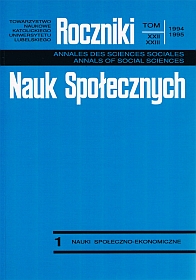Miejsce teorii Leona Petrażyckiego w polskiej refleksji teoretycznoprawnej pierwszych lat po II wojnie światowej (1945-1948)
Abstrakt
The paper shows the presence and influence of the scientific theories of Leon Petrażycki, the creator of the psychological theory of law in Polish jurisprudence in the first years after the Second World War. In this period which was the period of relative freedom for science and in which the multitude of standpoints and scientific orientations still abounded the position of Leon Petrażycki was quite strong. It was strong in spite of that almost all his Warsaw disciples from the youngest generation died during the war, and there were many scholars who disagreed with the psychological theory of law, although they more or less drew on some of its elements. In the Jagiellonian University Jerzy Lande, a faithful disciple of Petrażycki’s, still taught. His seminar members in the following years called the tune in the Polish theory and sociology of law. At Warsaw University there was Henryk Piętka, the former member of the sociological seminar. His Introduction to Law (1946) was based on the conclusions of his teacher. Attempts to put Jerzy Licki (Finkelkraut), the former Petrażycki’s assistant professor, at the Chair of the Theory of Law in the newly erected university in Toruń failed.
The studies of young Cracow scholars, which are scarcely known, bore the ever vivid stamp of Petrażycki’s scientific ideas. The author devotes particular attention to Roman Szydłowski’s publications. Szydłowski sought, among other things, to "lay bridges between the materialistic philosophy of life and the psychological theory of Petrażycki". The author concentrates on Grzegorz Leopold Seilder who drew on Petrażycki’s conception of the state’s authorities which postulates that in the studies on the constitution there be taken into account legal awareness of society. Finally, he mentions Aleksander Rudziń ski (Steinberg) who makes use of Petrażycki’s conclusion in the problems of the logic of norms.
Stalinism which was permeating learned life in Poland made it that in the end of the 1940s the non-Marxist conceptions were relegated from Polish universities, and even their selective reception was substituted by the holistic criticism from the Marxist point of view. Some of the former enthusiasts of Petrażycki’s conception, as for instance G. L. Seidler, soon became their opponents.
Copyright (c) 1995 Roczniki Nauk Społecznych

Utwór dostępny jest na licencji Creative Commons Uznanie autorstwa – Użycie niekomercyjne – Bez utworów zależnych 4.0 Międzynarodowe.


